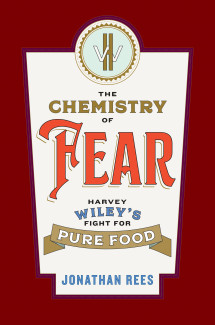
Johns Hopkins UniversityEst. 1876
America’s First Research University
Now Browsing:
The Chemistry of Fear: Harvey Wiley's Fight for Pure Food

Dr. Harvey Washington Wiley was the head of the Bureau of Chemistry in the U.S. Department of Agriculture, the precursor of today’s Food and Drug Administration. He is best remembered today as an important force behind the passage of the Pure Food and Drug Act of 1906 (PFDA), which was the first important national legislation of the Progressive Era. The PFDA was designed to prevent the addition of harmful ingredients into foods (known then and now as food adulteration), as well as the misbranding of packaged food products. In 1929, Wiley self-published a book called The History of a Crime Against the Food Law, in which he argues that his life’s work had essentially failed. “Under the law the Bureau was the sole judge...as to whether any sample of food or drugs was adulterated or misbranded,” Wiley wrote. “Those who adulterated our foods and drugs foresaw that if they could cripple the activities of the Bureau of Chemistry, they could save themselves from indictments. They proceeded along successful lines to affect this paralysis.”
Wiley’s interpretation of his own work has become an important part of the historiography about him. Wiley’s two main previous biographers, Oscar Anderson (who wrote The Health of a Nation in 1958) and Deborah Blum (whose 2018 book The Poison Squad is named after Wiley’s famous experiments designed to test whether food additives were harmful to human health) both echo this argument. They paint Wiley as a Progressive Era hero whose efforts to protect consumers using the PFDA were thwarted by conservative politicians and business interests. While any biography of Wiley has to cover his role in the campaign to get the Pure Food and Drug Act passed, I thought the impact of Wiley’s campaign to fight food adulteration on actual food deserved more attention. Looking through the subject files in the Wiley Papers at the Library of Congress, it became clear that Wiley’s general idea of pure food played out differently when applied to foods of all kinds. That’s why I organized most of my chapters in The Chemistry of Fear around these very distinct struggles.
Looking at all of these battles, I realized that Wiley’s positions hinged on the very modern concept of what foods he deemed to be “natural.” For example, Wiley argued that straight whiskey was perfectly healthy while attacking whiskeys that were made by shortening the aging process. He convinced the federal government to sue the Coca-Cola Company arguing that caffeine consumption was dangerous even though he drank tea and coffee himself, and left them completely alone. He opposed the use of the artificial sweetener saccharin, but is widely recognized as the father of the American beet sugar industry.

I found the struggle over how to enforce the Pure Food and Drug Act much more interesting than the struggle for its passage because it was in these bureaucratic debates that Wiley’s enormous impact on exactly what we eat is most apparent. Wiley convinced ketchup manufacturers to remove sodium benzoate (a common food additive still used today). This explains why ketchup is full of sugar rather than vinegar. Wiley’s suit over caffeine in Coca-Cola failed to eradicate the drink he thought was dangerous, but because of the public pressure that Wiley’s effort created, that company slashed the amount of caffeine in their signature drink and stopped marketing to children for decades afterwards.
I have examples like this in almost every chapter. Sometimes Wiley’s public efforts to change foods improved the quality of what Americans ate and drank. Sometimes they made little difference because either Wiley had the science wrong or technology made the question obsolete. It sometimes took decades for the impacts of these efforts to become apparent. So while I’m not sure Harvey Wiley would like the fact that The Chemistry of Fear departs from the idea of him as a Progressive Era hero, I hope he would nonetheless be happy that his attempts to enforce the Pure Food and Drug Act have proven far more historically significant than he thought they were.
Order The Chemistry of Fear: Harvey Wiley's Fight for Pure Food at the following link: https://jhupbooks.press.jhu.edu/title/chemistry-fear
Jonathan Rees is a professor of history at Colorado State University–Pueblo. He is the author of The Chemistry of Fear: Harvey Wiley's Fight for Pure Food, Before the Refrigerator: How We Used to Get Ice, Refrigeration Nation: A History of Ice, Appliances, and Enterprise in America, and Refrigerator.

Wiley’s interpretation of his own work has become an important part of the historiography about him. Wiley’s two main previous biographers, Oscar Anderson (who wrote The Health of a Nation in 1958) and Deborah Blum (whose 2018 book The Poison Squad is named after Wiley’s famous experiments designed to test whether food additives were harmful to human health) both echo this argument. They paint Wiley as a Progressive Era hero whose efforts to protect consumers using the PFDA were thwarted by conservative politicians and business interests. While any biography of Wiley has to cover his role in the campaign to get the Pure Food and Drug Act passed, I thought the impact of Wiley’s campaign to fight food adulteration on actual food deserved more attention. Looking through the subject files in the Wiley Papers at the Library of Congress, it became clear that Wiley’s general idea of pure food played out differently when applied to foods of all kinds. That’s why I organized most of my chapters in The Chemistry of Fear around these very distinct struggles.
Looking at all of these battles, I realized that Wiley’s positions hinged on the very modern concept of what foods he deemed to be “natural.” For example, Wiley argued that straight whiskey was perfectly healthy while attacking whiskeys that were made by shortening the aging process. He convinced the federal government to sue the Coca-Cola Company arguing that caffeine consumption was dangerous even though he drank tea and coffee himself, and left them completely alone. He opposed the use of the artificial sweetener saccharin, but is widely recognized as the father of the American beet sugar industry.

I found the struggle over how to enforce the Pure Food and Drug Act much more interesting than the struggle for its passage because it was in these bureaucratic debates that Wiley’s enormous impact on exactly what we eat is most apparent. Wiley convinced ketchup manufacturers to remove sodium benzoate (a common food additive still used today). This explains why ketchup is full of sugar rather than vinegar. Wiley’s suit over caffeine in Coca-Cola failed to eradicate the drink he thought was dangerous, but because of the public pressure that Wiley’s effort created, that company slashed the amount of caffeine in their signature drink and stopped marketing to children for decades afterwards.
I have examples like this in almost every chapter. Sometimes Wiley’s public efforts to change foods improved the quality of what Americans ate and drank. Sometimes they made little difference because either Wiley had the science wrong or technology made the question obsolete. It sometimes took decades for the impacts of these efforts to become apparent. So while I’m not sure Harvey Wiley would like the fact that The Chemistry of Fear departs from the idea of him as a Progressive Era hero, I hope he would nonetheless be happy that his attempts to enforce the Pure Food and Drug Act have proven far more historically significant than he thought they were.
Order The Chemistry of Fear: Harvey Wiley's Fight for Pure Food at the following link: https://jhupbooks.press.jhu.edu/title/chemistry-fear
Jonathan Rees is a professor of history at Colorado State University–Pueblo. He is the author of The Chemistry of Fear: Harvey Wiley's Fight for Pure Food, Before the Refrigerator: How We Used to Get Ice, Refrigeration Nation: A History of Ice, Appliances, and Enterprise in America, and Refrigerator.

Login to View & Leave Comments
Login to View & Leave Comments


